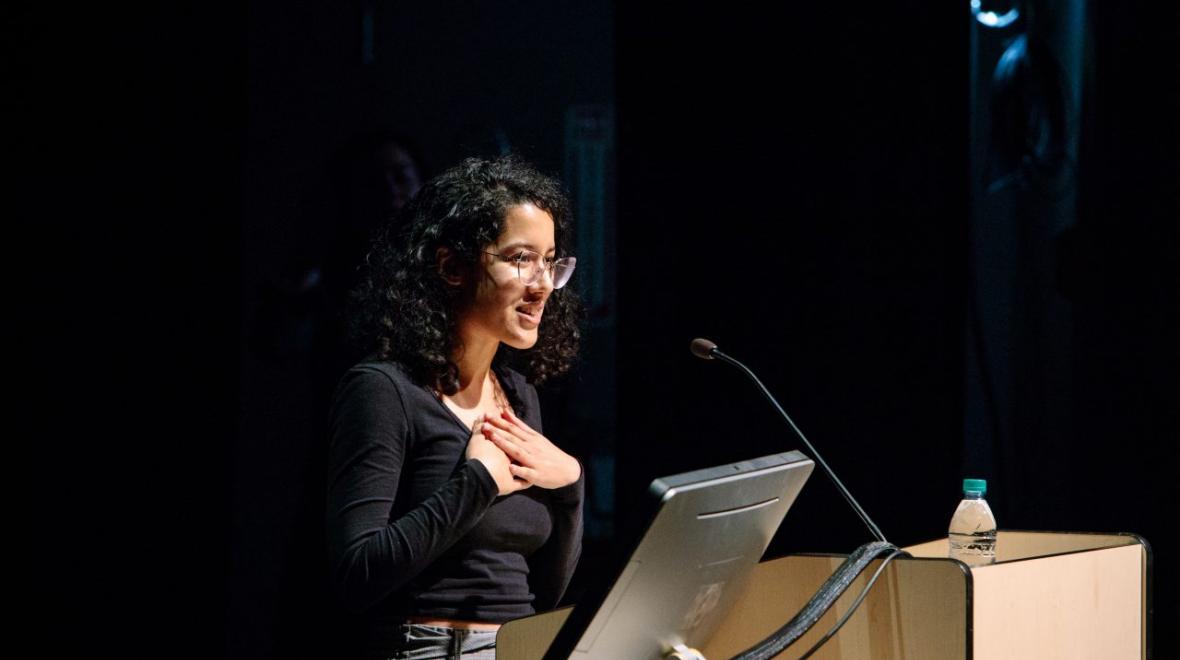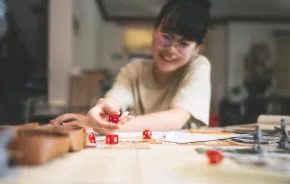
Azura Mizan Tyabji realized she liked writing poetry and being onstage while taking a class called Naked Truth at Nova High School in Seattle’s Central District. In this spoken-word poetry class, students explore the stereotypes that they feel have been assigned to them, analyzing how they do and do not fit them as a means of discovering their own identity. The class culminates in a spoken-word performance in front of the school community.
“I was shy as a freshman, and I didn’t see myself enjoying being on stage,” says Tyabji. “But I did like it, and everyone was like, ‘That’s cool, have you heard of Youth Speaks Seattle [YSS]?’”
Intrigued, Tyabji attended an open-mic event hosted by YSS, and there she discovered a warm, welcoming community and how it felt to be onstage.
Founded in 2003 by young poets, Youth Speaks Seattle cultivates youth leadership through spoken-word poetry. Tyabji’s involvement with the organization continues — she currently works as a teen leadership coordinator at YSS, directing its youth leader internship cohort, Spokes, which works with youth to strengthen their arts and activism skills through writing circles, poetry slams, open mics and other leadership opportunities.
“As a black and brown woman and a young person, my identity is always being questioned. The stage is a sanctuary where I can finally express myself. That’s not to say I won’t be questioned, but being onstage includes the paradox of feeling both invincible and very vulnerable,” says Tyabji. “As someone who is generally spoken over and who allows myself to be spoken over, actually being listened to and not interrupted onstage feels powerful.”
Tyabji’s talent for spoken word presentation and writing poetry has resulted in additional titles: She was selected as Seattle’s 2018/19 Youth Poet Laureate and was also named a regional finalist for the 2019 National Youth Poet Laureate position. In early April, the 18-year-old attended the National Youth Poet Laureate Commencement at the Library of Congress in Washington, D.C. The morning after she handed in her first poetry manuscript (which will be published this May), Tyabji spoke with us about her roles and goals.
How has being Seattle’s Youth Poet Laureate changed your performances?
I’ve been invited to speak on a lot of stages. I always try to keep in mind that I didn’t fight my way to the stage; the audience has gifted me that space. I think about how I can give back to the people who allowed me to be up here. When I’m asked to perform in front of rich white people, my attitude is thankful. But I also want my words to challenge [audiences] in ways you wouldn’t expect from a young person. I might not necessarily compel you to take action that’s meaningful, but I hope to convince you to think critically about systems of power. I have the tendency to end pieces on a hopeful note. Like, all of this stuff sucks, but it’s going to get better. But the audience might cling to the “It’s gonna get better” without hearing the rest of it. I might be moving away from that because things don’t get better [on their own]. You need to take action.
As an artist, what are your thoughts on Seattle’s transformation over the last decade?
I grew up all over the place: South Lake Union, Ravenna, Beacon Hill, Fremont, Ballard, Rainer Beach, the Skyway area. I’ve never been good at directions. I navigate through landmarks. I’ve become disoriented because these landmarks have disappeared. You blink and places are gone with no trace.
I was recently at Estelita’s Library, a new art space on Beacon Hill. Right next door there is a new land use action plan for some new building that is going up, but the people there said no one had told them that was going to happen when they were getting ready to open. The development means that their building will likely be torn down. There’s this complete disregard for people who are desperately trying to keep the artistic landscape intact. People are literally making plans to pave it over. Artists contribute to making Seattle this beautiful, artistic place, but most artists can’t afford to live here.
I’m actually interested in urban planning. I love living in a city and I wish that living in a city wasn’t increasingly becoming a privilege throughout the world. I want to make cities a place where young people, elders and everyone who is pushed out of the cities can live in dignity, creativity and comfort.
Tell us about your first poetry book, which will debut at Northwest Folklife this May.
It’s called “Stepwell.” I was in India for three weeks, visiting family and meeting family. Walking in Jodhpur in Northern India and walking around Mumbai, there’d be these craters in the middle of the city. They are ancient wells called stepwells — you walk down steps to get to the water. They are the most reliable sources of fresh water in cities and in places with a lot of people. Historically, these are gathering places for women: to get drinking water, wash clothes and bathe. I was really inspired by these oases in the heart of such bustling places. I think of this first book as a well of inspiration that I can always pull from, because, the first book, it’s not perfect. There’s no book that’s perfect, but it’s always going to be there and it’s going to be something I can pull from. I hope that’s what my writing is for people — a source of sustenance for those who need it — and a source of reflection, too.
Allegiance
By Azura Mizan Tyabji
Dear America,
As much as you believe your walls
are the only foundations I need,
I still have faith in other nations.
To begin, I pledge allegiance to my papa,
whose embrace feels like continents.
I pledge allegiance to the girls on Instagram
who gas each other up in every selfie.
I pledge allegiance to the heart-eyes emoji
and its star-spangled cousin.
I pledge allegiance to la tienda on the corner by the train,
sheltering kids who just don’t want to go home yet.
I pledge allegiance to The Station and the murals in SoDo,
to the Soufend, to a Northwest summer lake still cold
as my brother implodes its tides.
I pledge allegiance to the last brave gulp of air
before someone learns to swim.
I pledge allegiance to libraries,
and everywhere else left where you don’t have to pay to exist.
I pledge allegiance to the cocooning tent city on Town Hall’s lawn,
to the requests blasting outside the youth jail on New Year’s.
I pledge allegiance to the external battery friend
and the bus drivers who wait.
America, I am not starved of faith.
America, these, too, are nations in repair of you.
America, I need the diligence of a “did you get home safe?” text.
I need justice not hung by a price tag.
I need patriotism that’s more than a stiletto
on someone else’s pulse.
I don’t have a name for the change that’s happening yet,
just know I’ll be there,
juggling the pebbles in my shoes
as I sharpen my oyster knife on the mountain.
I’ll sit this squirming nation between my mama’s knees
as the bristle brush scrapes a pink trail down your coaxed neck
I will dare you, America, to move your head an inch
before you make the transformation
take any longer
and be any more painful
than it already is.
America, you have left the porch light off
far too many times,
you are running out of chances
to convince me you are still home.
I do not worship your tyranny or want to fill its shoes either.
My poetry is the mouse at the foot of your elephant,
I will leave you running
humbled,
knowing we grew someplace brighter
where your walls once
trampled.











